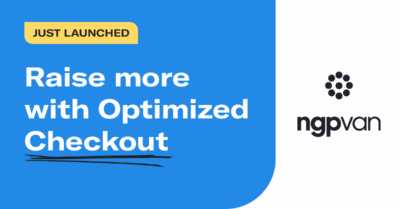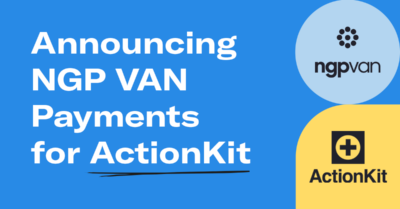20+ political campaign fundraising ideas that really work
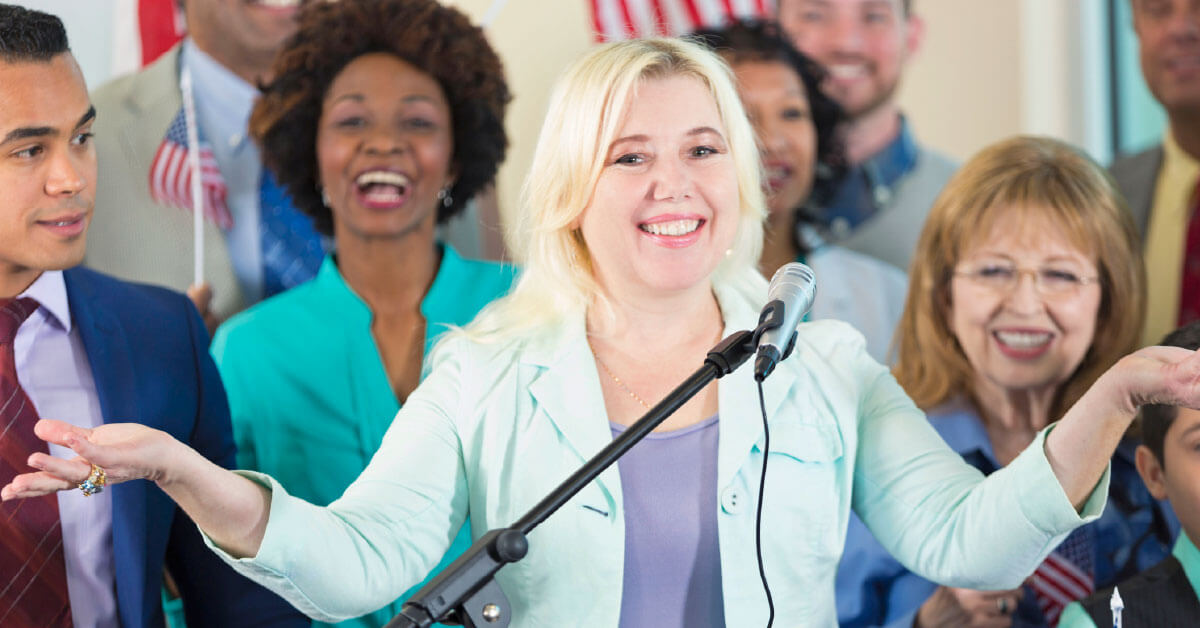
Every political campaign needs funding to get out the vote and win. Whether your expenses include advertising, get out the vote efforts, or staff compensation, the costs of running your campaign add up quickly. That’s why you need a well-designed fundraising strategy with targeted ideas that work.
Fundraising comes in all shapes and sizes, and it can be difficult to identify the best tactics to secure the support you need. Explore our list of political fundraising ideas to set your campaign up for success.
Tried and true political fundraising ideas
These fundraising methods have been tested by thousands of campaigns and represent staples that every campaign should use to maximize its fundraising.
1. Call time fundraising
Call time is an easy, inexpensive way to raise money for your campaign. All you need is a script that explains why donors should give to your campaign, a list of donors and their contact information, and an ask amount attached to each donor’s name. You’ll then call through the list to connect with potential donors and convince them to give to your campaign.
As you execute your call time program, you’ll quickly understand why investing in dedicated fundraising and compliance software is worth it. These tools can help you track attempted contacts, giving history, pledges, fundraising progress, and more to make outreach more effective. It’s an added bonus if that software also has a dedicated call time solution (like Call Time Mobile) that makes it easy for campaigns to reach out to donors.
2. Fundraising events
Whether you’re hosting a traditional fundraising event, a karaoke night, or a Virtual Princess Bride Reunion, there’s simply no shortage of political fundraising event ideas. Events are typically split into two different categories: in-person and virtual. We’ll explore some of the best fundraising event options below.
No matter what type of events you host, ensure you follow relevant campaign finance laws to prevent any campaign finance violations and hefty fines associated with them.
3. Multichannel outreach
Not every donor will answer a phone call, so try a range of outreach methods to increase your odds of connecting with them and securing donations. Multichannel outreach helps you diversify your fundraising efforts and meet donors where they are.
For instance, some donors may give because of an email or digital ad, while others prefer a phone call or letter. Track which channels earn donations from specific individuals to optimize your outreach and reach donors more efficiently.
4. Endorsements from PACs or labor unions
Some PACs and labor unions offer their endorsed candidates financial support in both primary and general elections. While being endorsed by these groups does not guarantee a contribution, some will give to the candidates they want to win.
These groups typically have formal endorsement procedures you must follow before they will give any financial contributions. Follow those procedures and make the case as to why you’re the best candidate for the job. Organizations typically send a notice if you’ve been endorsed, which may include a check to your campaign.
5. Major donor fundraising
Major donors are individuals who provide significant contributions to your campaign. Even if you prioritize small-dollar donations, you’ll likely have at least a few major donors who are instrumental in helping you reach your fundraising goals. Use a fundraising database to identify potential major donors and create plans to secure their support.
6. Campaign merchandise
Many people would love to show off their support for your campaign in their day-to-day lives. Work with a local printer or custom t-shirt website to design branded merchandise with your campaign’s logo. Then, sell merchandise on your website or at events and rallies.
For instance, take a look at this ad for the Collin County Democratic Party’s merchandise. They sell t-shirts, signs, and other “block walking swag” donors can wear to publicly support their campaign:

Fundraising event ideas
Nearly any event can become a campaign fundraiser. From 5K runs to bar crawls to extravagant soirees, fundraising events can take many forms and raise varying amounts of money. Here are a few effective ideas.
7. Traditional in-person events
One of the most common fundraisers for political campaigns are in-person events. Although in-person events typically require more planning and a larger budget than virtual events, they are a valuable way to expand your donor list and secure gifts from donors you may not have connected with otherwise. These in-person events can range in terms of cost and preparation required — from house parties to galas. Make sure you understand all of what’s needed for your event in advance so you can plan accordingly.
Consider other event logistics, such as if food or drinks will be available for attendees. Some campaigns will ask a volunteer to serve as an event planner, have an events team or committee, or even pay for a professional event planner to help plan the event and coordinate work on the day of the fundraiser.
8. Activity or theme-based fundraisers
In addition to more traditional fundraisers, some campaigns branch out to try something different. From 5K runs to karaoke nights to theme events, campaigns can center their fundraising efforts around other ideas to connect with new donors, re-engage with supporters, and raise money along the way. These events come with their own challenges, but if you plan far enough in advance, you should be able to handle them easily.
9. Virtual events
In addition to in-person events, there are plenty of virtual events you can host, especially if you have supporters in different geographic locations. For instance, some candidates may receive support from different regions if they’re in a highly competitive race or originally from a different area.
Plan technical details, logistics, and required software you might need for a virtual event. For instance, who will be speaking and when? How and when will attendees receive a link to the video call? How long will the event last? Planning all of this in advance will make your virtual event flow slowly.
Online political campaign fundraising ideas
More and more, candidates of all kinds rely on online donations for much of their fundraising revenue. Let’s explore a few of the best ways to raise money online.
10. Donation page on your campaign website
To raise money online, you must have an online donation page. Typically, campaigns add donation forms to their campaign websites and link to them throughout their site, like in the navigation bar or at the end of important sections, so supporters can easily find them.
The page itself should be simple, straightforward, and aligned with your campaign’s branding so donors trust it. Limit form fields to only necessary information, like donors’ names, email addresses, and payment details. To encourage larger donations and make giving easy, include suggested donation amounts and a recurring giving option. Make sure that your donation pages allow donors to input the information you need to remain compliant.
11. Digital advertising
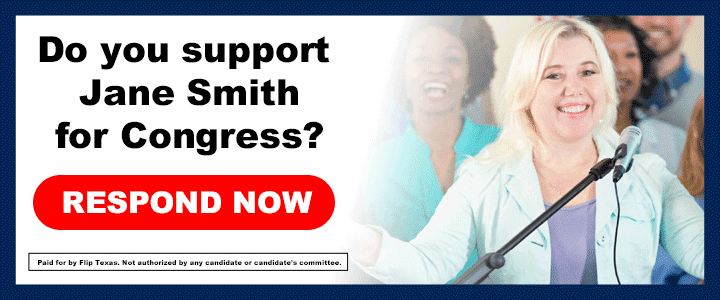
Once you have a donation page, digital advertising offers another avenue to acquire new donors and engage with existing supporters. Buy ads on social media and Google to access new, qualified audiences for your campaign.
With the right tools, you can even use your supporters’ email addresses for retargeting, lookalike, or suppression purposes on Facebook to easily create customized ads. You can also run digital ads on other social media platforms as well — just make sure your ads are compliant with necessary disclaimers. Once you launch these ads, track ROI and pull reports to measure your fundraising progress through your digital fundraising campaigns.
12. Email marketing
Email is an important part of any multichannel fundraising strategy. Plan several types of fundraising emails, then use a political email tool like Targeted Email to create, personalize, distribute, and track your messages. With our tools, you can even use multivariate testing to try out several variations of an email and discover which has the most fundraising success.
13. Social media promotion
While organic social media isn’t a very reliable fundraising channel on its own, it can be instrumental in expanding your campaign’s reach and drawing attention to your other fundraising efforts. By creating a consistent, compelling social media presence, your campaign can engage supporters on a day-to-day basis and develop relationships that potentially lead to giving. Use social media as a tool for spreading information, promoting events, and increasing campaign awareness. As we mentioned before, you can also use paid social media strategies to engage with your followers or supporters who may have a higher likelihood of giving by seeing social media ads.
Grassroots political fundraising ideas
Many campaigns raise significant amounts from grassroots donors, or those who give small-dollar donations. Use these fundraising ideas to mobilize large numbers of grassroots donors for your campaign.
14. Crowdfunding
Create an online, compliant crowdfunding page for your campaign to raise money from many donors on a quick timeline. Crowdfunding typically involves one streamlined fundraising page with a real-time list of donors and social sharing buttons. This way, prospective donors will get inspired by the support you’ve already received and be able to spread the word easily.
15. Text banking
Looking for a way to reach more donors than you can with call time? Try text banking in addition to your call time fundraising. While texts aren’t as personal as phone calls, they can cut through the noise and reach large numbers of supporters.
Plus, tools like NGP VAN’s Mobile Messaging can help you quickly personalize and schedule messages for individual supporters, increasing the chances that recipients take action.
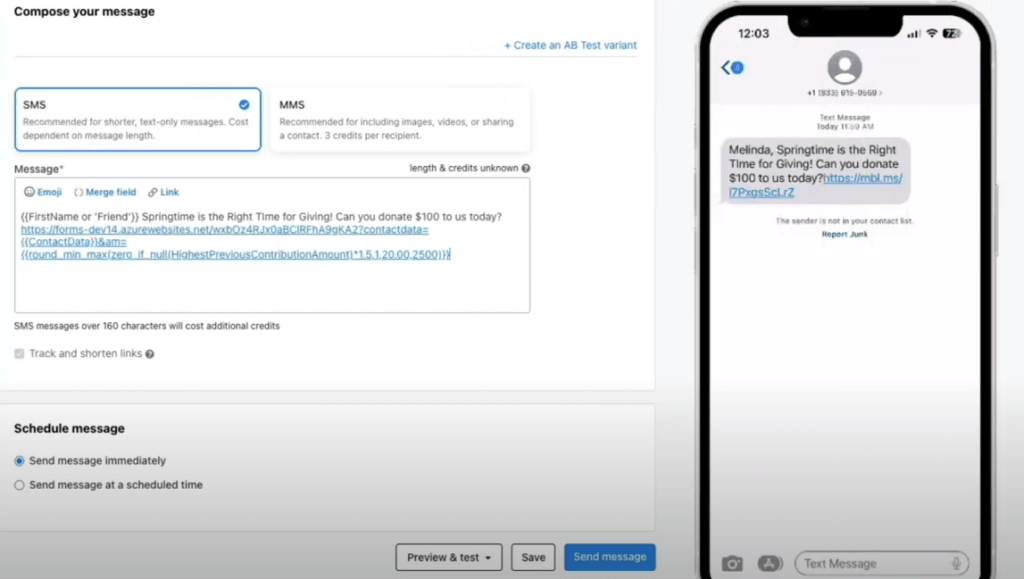
16. Call on supporters to ask their peers to donate
Asking your supporters to reach out to their peers to generate additional donations can build your donor network and raise money. Your supporters likely know others in their communities who would be willing to give to your campaign. By encouraging them to do so, you can gain new supporters that may give multiple times over the course of the election cycle.
17. Matching funds
Find donors who are willing to contribute to a matching fund. To be clear, these matching fund donors will contribute to your campaigns as individuals. However, some donors may be more willing to donate to your campaign if someone else donates as well, doubling the amount of money given to the campaign overall.
Best practice campaign fundraising ideas
No matter which of the above political campaign fundraising ideas you try, use these best practices to get the best results.
18. Get insights from Donor Target Scores and Reports
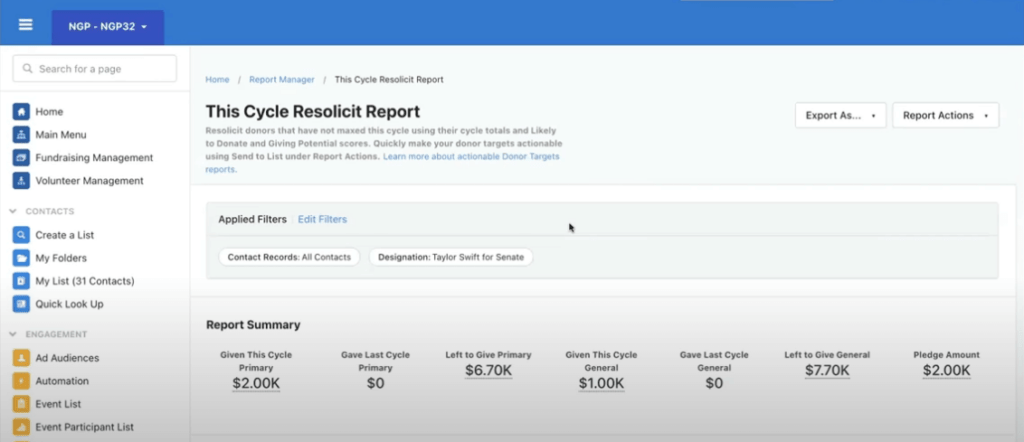
With Donor Target Scores and Reports, NGP models a contact’s giving potential and likelihood. These two scores combine to provide you with a Suggested Fundraising Effort, a measure to help you prioritize donors who are the most likely to give at the highest capacity.
Donor Target Reports also allow you to easily identify prospective donors, donors who gave this cycle but could be asked again, and those who gave last cycle but have not given this cycle. By using NGP’s powerful innovations, you can quickly analyze your donor base and act on those insights to raise more for your campaign.
19. Mention specific expenses in donor outreach
Donors give for different reasons, and some want to know what their money will be used for. Whether it’s a tangible item (like yard signs or campaign literature) or something else (like digital ads that will be seen by thousands of voters), donors want to connect their gifts to a clear outcome that benefits the campaign.
When creating your campaign finance plan and budget, detail expenses that you can use in conversations with donors. If you need to raise $1,000 for campaign literature, use that number in conversations with donors and explain why this expense is so important to your campaign’s success.
20. Encourage donors to give again
Existing supporters don’t need to be convinced to support your campaign, but they do need to be asked to give again. Make sure to thank them for their support so far during the campaign, explain that you still need to raise more money to hit your fundraising goals, and ask them to give again.
Making the most of these political fundraising ideas
We know fundraising for your political campaign can be challenging (especially for first-time candidates), but these ideas should help you start raising money in no time. After reading through this list of political fundraising ideas, determine which ones you could execute for your campaign and start planning them. Early planning can be critical to your fundraising success.
Want to learn more about political fundraising for your campaign? Book a consultation to learn how NGP VAN can help!





